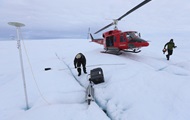Foreign intelligence agencies, including those from China, Russia and Iran, have been trying to reach out to explorers in the Arctic to glean information about Danish technology.
Denmark warned of a growing threat of espionage from Russia, China, Iran and other countries, including in the Arctic region, where world powers compete for resources and sea lanes. The Arctic is attracting more and more interest from neighboring countries in light of climate change. And spies have recently begun to act brazenly and openly. Korrespondent.net tells the details.
Attractive target
The Danish Security and Intelligence Service said there were numerous attempts to spy on the state, whose active role on the world stage made it an attractive target, writes Reuters.
“The threat of foreign intelligence activity against Denmark, Greenland and the Faroe Islands has intensified in recent years,” counterintelligence chief Anders Henriksen said in a report.
Greenland and the Faroe Islands are sovereign territories of the Kingdom of Denmark and members of the Arctic Council Forum. Copenhagen handles most of their foreign and security affairs.
The report mentions a 2019 incident involving a forged letter allegedly sent by Greenland’s foreign minister to a US senator saying an independence referendum was around the corner.
“It is very likely that the letter was fabricated and distributed on the Internet by Russian agents of influence who wanted to create confusion and possible conflict between Denmark, the United States and Greenland,” the report says.
The Danish report also says that foreign intelligence agencies, including those from China, Russia and Iran, have tried to reach out to students, researchers and companies to get information about Danish technology.
“Denmark’s active participation in the international arena, growing globalization and international competitiveness, the general openness of society, digitalization and a high level of technological knowledge are all factors that make Denmark an attractive target for foreign intelligence activities,” the report says.
Increased interest
The Arctic is gaining more and more geopolitical importance as Russia, China and the United States compete for access to natural resources, sea lanes, research and military strategic areas.
Interest in the Arctic has grown significantly in recent years, when it became clear that, due to global warming, Arctic waters have become more favorable for navigation and the development of natural resources.
Russia, Canada, the USA, Norway and Denmark are considered to be subarctic states. Iceland, Sweden and Finland also claim this status, although they do not have oceanic borders with the Arctic.
Activities in the Arctic are regulated by the national laws of the Arctic states, a number of bilateral agreements and partly by international agreements, which do not affect the legal status of the region.
The struggle for the Arctic began in the 20th century, when the Arctic states began to claim their rights to the Arctic territories up to the North Pole.
The Arctic can become a source of international tension due to competition for access to its resources, writes D.W. According to the US Geological Survey, about 22% of the world’s undiscovered hydrocarbon resources lie under the ice. At the same time, 84% of the resources are located on the shelf of the Arctic Ocean and only 16% – on the land territory of the Arctic states within the Arctic Circle.
Brazen and open
Aggressive Russian espionage within the EU has become increasingly public in recent years as European governments openly accuse Russian agents of assassination attempts, sabotage of weapons depots and intrusion into political institutions with impunity.
Some European intelligence officials say Russian spies have become more brazen and less concerned about their exposure. Others argue that Russian agents have always been very active, they just have become more visible now, thanks in part to the digital footprints they leave behind.
“The masks are off,” Arnold Sinisalu, the head of the Estonian Internal Security Service, whose closeness to Russia has made him keenly aware of Moscow’s covert behavior, said earlier.
“The Russian intelligence services, in their actions in Europe, have disregarded the feigned respect for international law, ethics, or even human life,” – quotes his words Politico.
Intelligence officials say Europe is constantly confronted with operations that can be deadly, disruptive and spread misinformation.
“Russian intelligence is a constant threat to European countries. Its activity is almost constantly at a high level,” said Antti Pelttari, director of the Finnish Security and Intelligence Service.
Last April, the Czech Republic said it had evidence that Russian agents were involved in the 2014 bombings at ammunition depots that killed two people.
Shortly thereafter, Bulgaria, which had previously charged Russian citizens with poisoning an arms dealer, said it now also suspects Moscow’s involvement in a series of bombings at arms depots between 2011 and 2020.
One hypothesis put forward by Bellingcat and other media outlets is that the bombings in the Czech Republic and Bulgaria, as well as the poisoning of an arms dealer, were aimed at disrupting a possible export of weapons and ammunition to Ukraine.
Russia has denied these and other accusations leveled against it in the EU, which Moscow says are part of an effort to smear the country’s reputation.
At the beginning of this year, information appeared that eight “diplomats” expelled in 2021 from the Russian representation at NATO headquarters were Russian spies.
And the other day, the Latvian State Security Service announced that it detained two people last year who are suspected of long-term cooperation with Russian military intelligence.
Spy Scientists
At the end of last year, it became known that a Chinese professor at the University of Copenhagen secretly spent a genetic study with the Chinese military, which is an example of how China’s pursuit of civil-military technology is tapping into Western academia in the strategically sensitive area of biotechnology.
Professor Guojie Zhang also works for the Shenzhen genomics giant BGI Group, which funds dozens of researchers at the university and has its European headquarters on the university campus.
Zhang and his student worked with a Chinese People’s Liberation Army lab on studies that put monkeys at extreme heights to study their brains and develop new drugs to prevent brain damage, a priority the PLA has set for Chinese troops operating on the high plateaus.
Another story with a professor was widely reported in December last year, when Harvard University professor Charles Lieber found guilty of concealing cooperation with China and the fact of funding from China.
The American took part in China’s Thousand Talents Program, which hires foreign experts to share their knowledge with China.
Prosecutors also charged Yanqing Ye, a robotics researcher at Boston University who posed as a student while serving in the Chinese People’s Liberation Army on a series of assignments in the US.
Cancer researcher Zaosong Zheng was arrested at Boston International Airport with 21 vials of biological samples in a bag. Prosecutors say he planned to return to China to continue his research there.
In 2020, the Security Service of Ukraine reported that Chinese citizen Shu Yuanjie sentenced to ten years in prison for espionage. The investigation proved that, having a doctorate in technical sciences, the spy carried out intelligence activities under the guise of official scientific and technical cooperation between China and Ukraine.
And in the middle of last year, a group of cyberspies Charming Kitten, associated with the Islamic Revolutionary Guard Corps, an elite Iranian military-political formation, was exposed in London. Its members posed as academic staff at the University of London.
News from Korrespondent.net in Telegram. Subscribe to our channel https://t.me/korrespondentnet
– .


